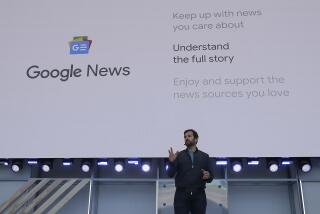Bid to Put Commercial TV in Classrooms Fails : Education: Bill’s author couldn’t overcome opposition to inclusion of advertising in programming.
- Share via
SACRAMENTO — A Tennessee company that stirred national debate last year when it introduced a commercial broadcasting service for schoolchildren lost Wednesday in its effort to beam the program into California classrooms.
State Supt. of Public Instruction Bill Honig had banned state schools last year from subscribing to Channel One, a 12-minute daily news program produced by Whittle Communications of Knoxville, Tenn. Because the programming includes two minutes of commercials, Honig argued that it exploits children for commercial gain.
An Assembly bill was introduced designed to overturn Honig’s ban, but its author admitted Wednesday that he did not have the votes to move the legislation past the powerful Assembly Ways and Means Committee. Assemblyman Stan Statham (R-Redding), concluding he could not overcome hostility from committee Democrats, withdrew his bill before it could come to a vote.
Statham said he may ask the committee next week to finance a study of the Channel One concept. “Score one for the good guys,” said Bill Ruckeyser, a top aide to the superintendent. “But we’re realistic enough to know that you can drive a thousand stakes through this thing’s heart and it can still rise from the grave.”
Channel One, launched in March 1989, would offer subscriber schools $50,000 of free video equipment, including TV sets, VCRs and a satellite dish. In return, the students would have to watch a 12-minute daily program produced by Whittle Communication that features not only news and educational shows but also commercials for such products as tennis shoes and potato chips.
Whittle officials argue that the service, which has been picked up by more than 2,500 schools in 34 states, offers an important educational opportunity for schools to teach their students about world affairs and get free video equipment in the bargain.
But the Channel One concept has been attacked by many educators around the nation, who have accused Whittle of putting profits before children’s interests.
“Parents entrust their children to our public schools,” said Honig. “We have no right, legally or morally, to sell access to our children even if schools receive some benefit in return.”
In an attempt to overturn California’s ban, Whittle launched an intensive lobbying effort in Sacramento that has cost more than $40,000, according to records filed with the secretary of state’s office. The largest chunk of that money went to hire Nielsen, Merksamer, Hodgson, Parrinello & Mueller, a high-powered San Francisco lobbying/law firm whose partners include Steven Merskamer, onetime chief of staff to Gov. George Deukmejian, and former state Senate Minority Leader Robert W. Naylor.
On the other side of the issue was a lobby, spearheaded by Honig’s office, that included the California Teachers Assn. and the Parents, Teachers and Students Assn.
More to Read
Sign up for Essential California
The most important California stories and recommendations in your inbox every morning.
You may occasionally receive promotional content from the Los Angeles Times.










